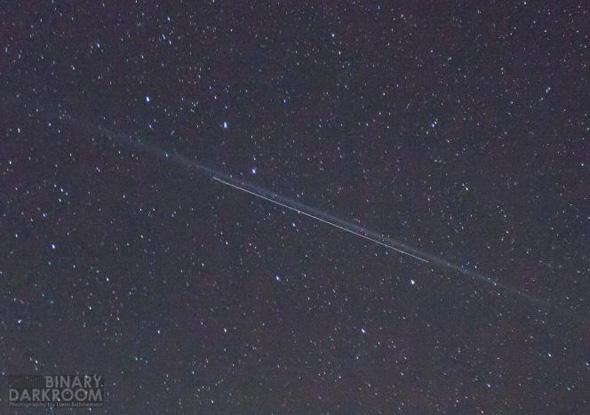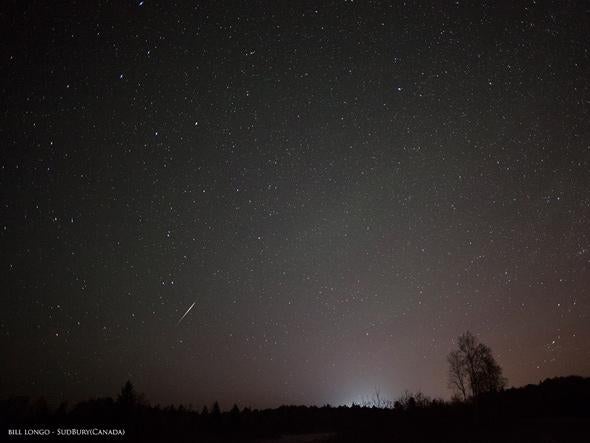Well, sorry about that. The Camelopardalid meteor shower took place Friday night but didn’t perform as expected. Quite a few observers saw some nice meteors, but the 100–400 per hour never materialized.
Predicting meteor showers, even established ones, can be hard. Sometimes it works, and sometimes it fizzles. This one, being from a comet just discovered a few years ago, and the first time the Earth got close enough to get a shower, made it that much harder. That’s why, in my post about the shower, I was cautious to use weasel words like “may,” “might,” and of course “hope.” In the end, we just don’t know exactly what the comet will do—in fact, astronomers have a joke (coined by my pal David Levy): How is a comet like a cat? They both have tails, and they both do precisely what they want.
Still, while the big show never materialized, there were meteors to be seen. The shot at the top of this post was taken by photographer Bill Longo (who has been featured on this blog before, like here and here). That’s definitely a Camelopardalid; it’s heading away from the radiant in the constellation Camelopardalis. In fact it appears to be hightailing directly away from Polaris, in the upper right part of the picture (the bowl of the Big Dipper can be seen at the upper left).
I got a lot of tweets from people who went out to see the shower and got bupkus. It was cloudy here in Boulder, Colorado (we got a huge rain storm just before sunset, too), so I didn’t get to see anything at all, but I still felt for folks who went out—on my advice—to see a shower that didn’t perform. But those tweets also lifted my spirits, because the majority of them weren’t complaining at all. In fact, they were happy to have time to go out under the stars with friends and loved ones. Many proclaimed the beauty of the heavens, too.
That made my heart sing.
And a few folks got a very cool, if very bizarre show. Reader Liem Bahneman sent me email about a weird sight during the shower: a long, fuzzy, fan-shaped streak of light in the sky that moved like a cloud … but it had a sharper, point-source of light inside it moving along with it! He got some great shots of it:

Photo by Liem Bahneman, used by permission
I could’ve guessed what it was, but over at Universe Today Bob King saw the same thing, and found out it was the newly launched Japanese satellite Daichi-2 booster performing a fuel dump in space. The booster is the dot, and the fuel expanded to form the cloud. They were in orbit, so they moved together across the sky faster than the stars rising and setting.
Fuel dumps can be very, very striking and incredibly startling. Just ask anyone who saw the Norway Spiral.
And that’s another reason why I didn’t feel too badly about people going out even for a meteor shower that may have disappointed: Because when you have clear skies, the view is never disappointing. And you really never know what else you might see.
